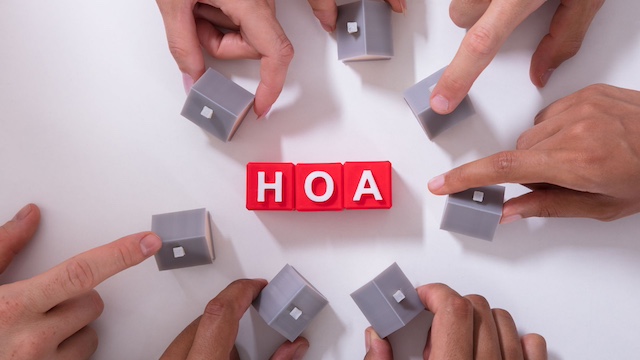There are lots of things to learn when becoming an HOA board member, but one of the most overlooked is the number of terms you’ll need to know. The community association management industry is full of names, abbreviations, and acronyms, and it can quickly become confusing if you aren’t sure what they mean. However, with the help of our glossary of important HOA terms, you’ll become an expert on the essential words and phrases you need to know as a board member.
HOA Terms and Definitions
Below are some of the most common HOA board terms you should familiarize yourself with. Keep in mind you can always reference this guide should you need a refresher.
Community Association Manager (CAM)
CAMs oversee the daily operations of homeowner associations, condominiums, and planned communities. Their role is to serve community association developers, builders, service providers, boards, and homeowners by analyzing financial statements, budgets, management reports, and insurance requirements and managing deed restriction enforcement. They usually attend board and annual meetings, manage association documents, and owner communication. They also guide board members in making decisions on behalf of their association to meet their responsibilities as elected directors of their membership. Essentially, their role is to maintain the smooth functioning of the community while upholding its standards and addressing residents' needs.
Board of Directors (BoD)
For community associations to function effectively, they create a board of directors elected by the homeowners and are authorized to act on their behalf. The board consists of a president, vice president, secretary, and treasurer.
As a board member, you are responsible for enforcing guidelines, rules, restrictions, and conditions, referred to as governing documents put in place by the developer of the community. Board members also have the authority to enact fines if there is a violation of one of the set rules.
Request for Proposal (RFP)
In many industries, the initials RFP stand for request for pricing. However, that isn’t the case when it comes to HOAs/community associations. In this industry, an RFP/request for proposal is a package prepared by a community association manager when soliciting proposals for a service needed at a community association.
The proposal often includes specifications, a site map, insurance requirements, and specific instructions on how and when to submit a bid.
Service Level Agreement (SLA)
A service level agreement (SLA) is a contract between a service provider and a customer that specifies the nature and quality of the services to be provided. In the context of a community association, SLAs are often used to define the level of service expected from vendors.
For example, an association might contract vendors to provide 24-hour security, snow removal, and landscaping services. In return, vendors would agree to meet certain performance standards, such as response times for security incidents or turnaround times for snow removal.
Bylaws
Community association bylaws are a set of rules and procedures that govern the operations and management of the homeowners association. These bylaws establish the framework for how the HOA operates, including details about board elections, meetings, decision-making processes, and the roles and responsibilities of board members and homeowners.
Bylaws provide structure and guidance for the association's activities, ensuring consistency, transparency, and adherence to legal requirements. As board members, it's crucial to familiarize ourselves with the bylaws and ensure they are followed effectively to uphold the integrity and efficiency of the homeowners association.
Covenants, Conditions, and Restrictions (CC&Rs)
The declaration of covenants, conditions, and restrictions (CC&Rs) constitutes a legally binding document filed with the county's recorder, becoming an integral part of the official real estate record. It delineates the rights, responsibilities, rules, and limitations within a community association. CC&Rs typically elucidate homeowners' entitlements and limitations regarding property use, including regulations pertaining to noise levels, pet ownership, and parking areas, among other stipulations.
Architectural Control Committee (ACC)
An architectural control committee is made up of volunteers who are typically chosen by the board of directors.
The committee is responsible for reviewing and approving all changes to the physical appearance of homes in the community. This includes things such as adding a new deck or changing the paint color, as well as any changes to the landscape, such as planting new trees or installing a new irrigation system.
Automatic Clearing House (ACH)
The automatic clearing house (ACH) is a system that automates the process of sending and receiving payments. Instead of writing and mailing paper checks, ACH transactions are processed electronically. This makes payments faster and more efficient, and it helps to reduce costs for your association.
ACH transactions can be used for a variety of purposes, including direct deposit of paychecks, automatic bill payments, and tax refunds. The ACH network is operated by the nonprofit National Automated Clearing House Association (NACHA). NACHA sets the rules for the ACH network and oversees the clearing and settlement of transactions.
Statement of Values (SOV)
When most people see the term “statement of values,” they immediately assume it has something to do with the community’s core values and beliefs. In reality, though, it has a much different meaning.
A statement of values is a document required when seeking insurance for a community association that lists the insured value of each asset. This statement helps ensure that the association isn’t over or under-insured.
Assessments and Fines
Fees concerning community associations are the legal assessments collected from every homeowner depending on different associations and governing documents. These assessments pay for property maintenance and repairs or are used to revamp the amenities. The levy amount is subject to agreement/decision by the board of directors.
Fines, on the other hand, come into action when there is an infringement of the rules that have been laid down. Fines are per the governing document or local/state laws. They range from improper disposal of garbage to illegal parking, speeding in residential ways, or even not picking up after a pet.
Generally Accepted Accounting Principles (GAAP)
Generally Accepted Accounting Principles, or GAAP, are a set of guidelines used by accountants to prepare financial statements. GAAP includes principles like the historical cost principle, which states that assets should be recorded at their original purchase price, and the conservatism principle, which says that companies should err on the side of caution when estimating future liabilities.
While GAAP is not legally binding in the United States, many investors and lenders require companies to follow GAAP guidelines when preparing financial statements. As a result, most businesses, including RealManage, make a point of following GAAP in order to maintain credibility with investors and creditors.
Fair Debt Collection Practices Act (FDCPA)
The FDCPA is a law that protects consumers from being abused or harassed by debt collectors. It is important to understand your rights under this law, as well as what debt collectors can and cannot do when trying to collect a debt from you.
This means that debt collectors cannot threaten you with violence, use obscene language, or lie to you about the amount of money you owe. They also cannot call you excessively, at odd hours, or try to contact you at work if they know that your employer does not allow personal calls.
If a debt collector violates the FDCPA, you may be able to sue them and recover damages.
Reserve Fund
A reserve fund is a designated pool of money set aside by the association to cover the anticipated costs of major repairs, replacements, or unforeseen expenses related to common areas and community infrastructure. These expenses typically include items such as roof replacements, repaving of roads, or major equipment repairs.
The reserve fund serves as a financial safety net, ensuring the association can afford necessary maintenance and improvements without imposing sudden, large assessments on homeowners.
Enhancing Your Understanding of HOA Governance
Prioritizing continuing education is one of the keys to success as a board member. Not only will this knowledge help you instill trust among the residents of your community, but it can also help you become much more confident in your role.
RealManage takes pride in offering educational resources to our board members. From webinars to helpful blog posts like this one, we work hard to ensure that you’re able to serve your community to the best of your abilities.





